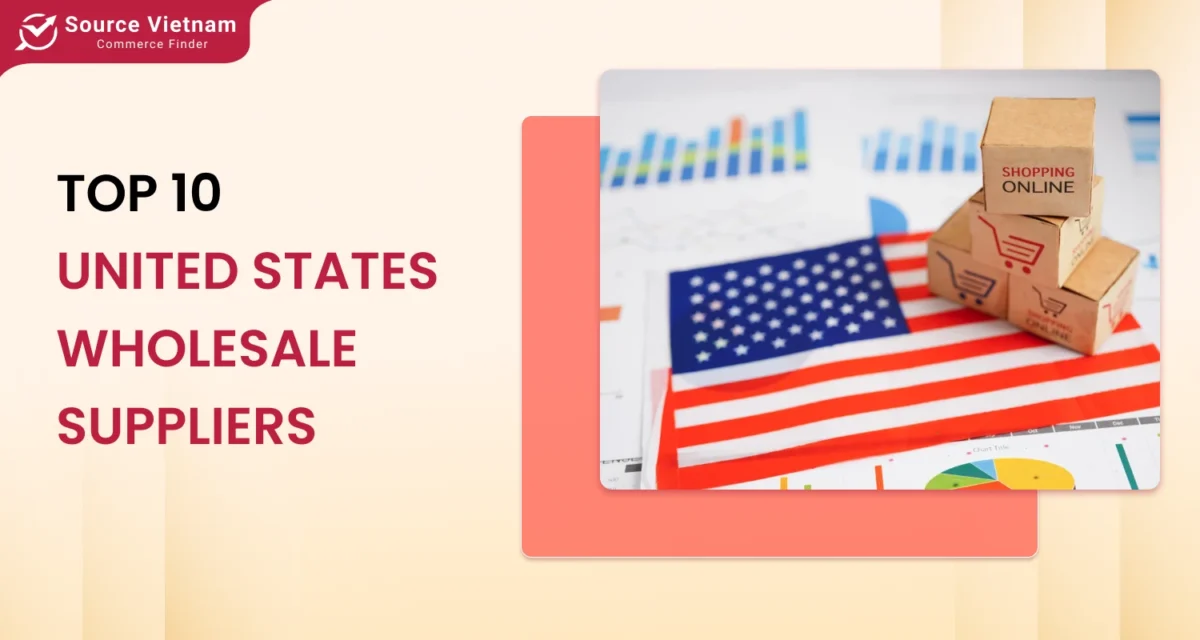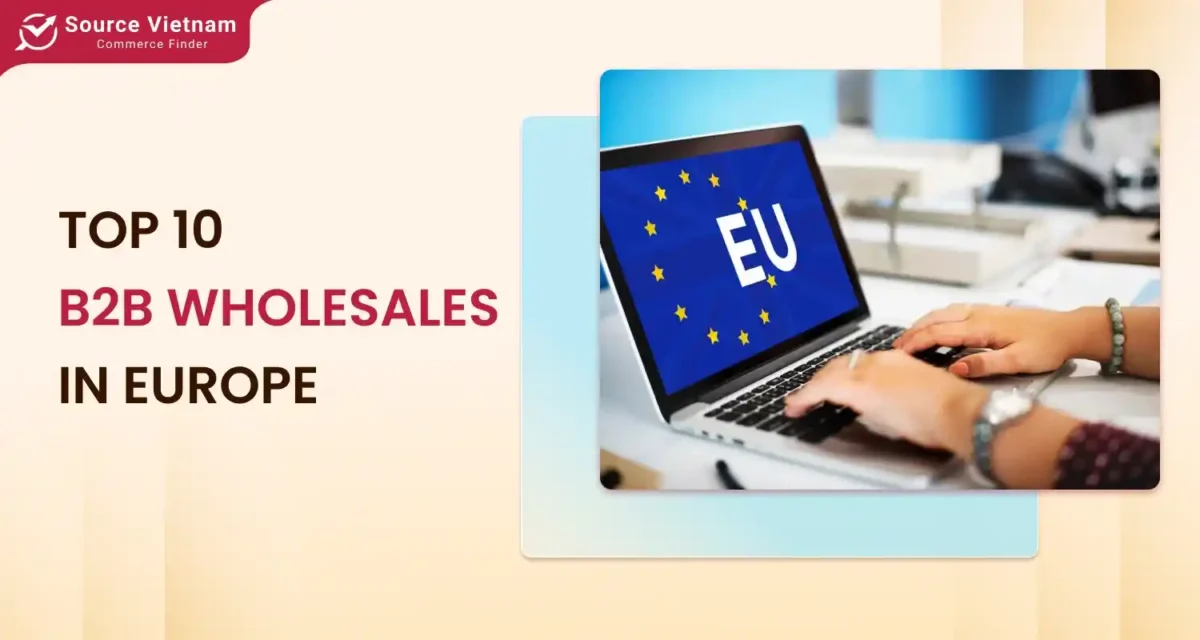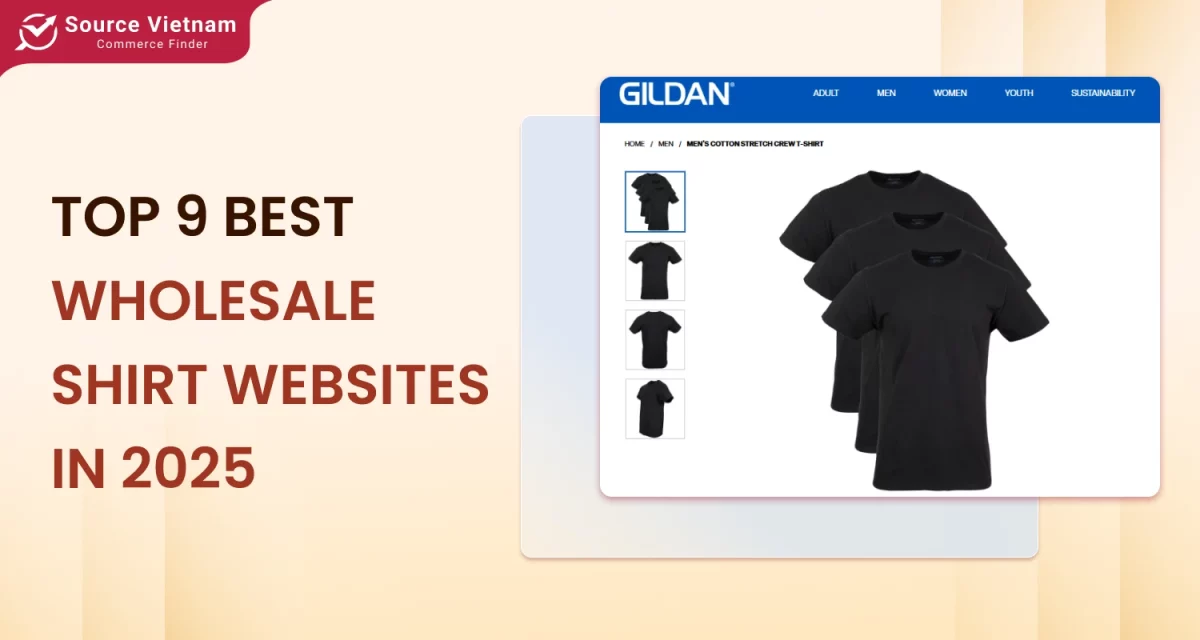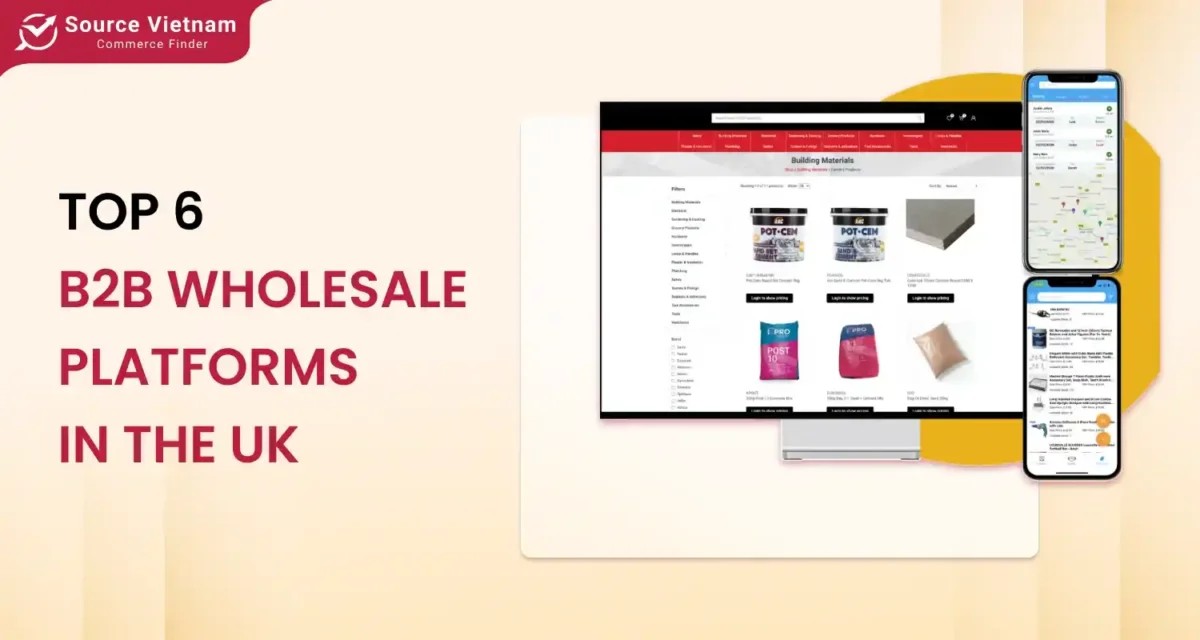Using the SEMrush tool, we discovered that more than 27,100 people had searched “What is B2B?” in just 6 months, and the figure is continually increasing. SourceVietnam.com has developed a comprehensive guide to help business owners and entrepreneurs gain a thorough understanding of the topic.

What is B2B?
B2B stands for business-to-business, a company offering products and services to other companies instead of their users. Manufacturing, logistics, and technology companies use B2B to purchase raw materials and deliver products or services. Wholesales, retailers, marketing companies, and software providers are also employed in the B2B business.
The rise of B2B eCommerce in the economy
According to Amazon’s report, B2B e-commerce is the main focus. It’s booming! Many professionals and businesses are searching for suppliers online. Over 73% of those searching for suppliers use their mobile devices to research possible items.
According to a McKinsey survey, 70% of B2B executives are expected to spend more than $500,000 on e-commerce transactions.
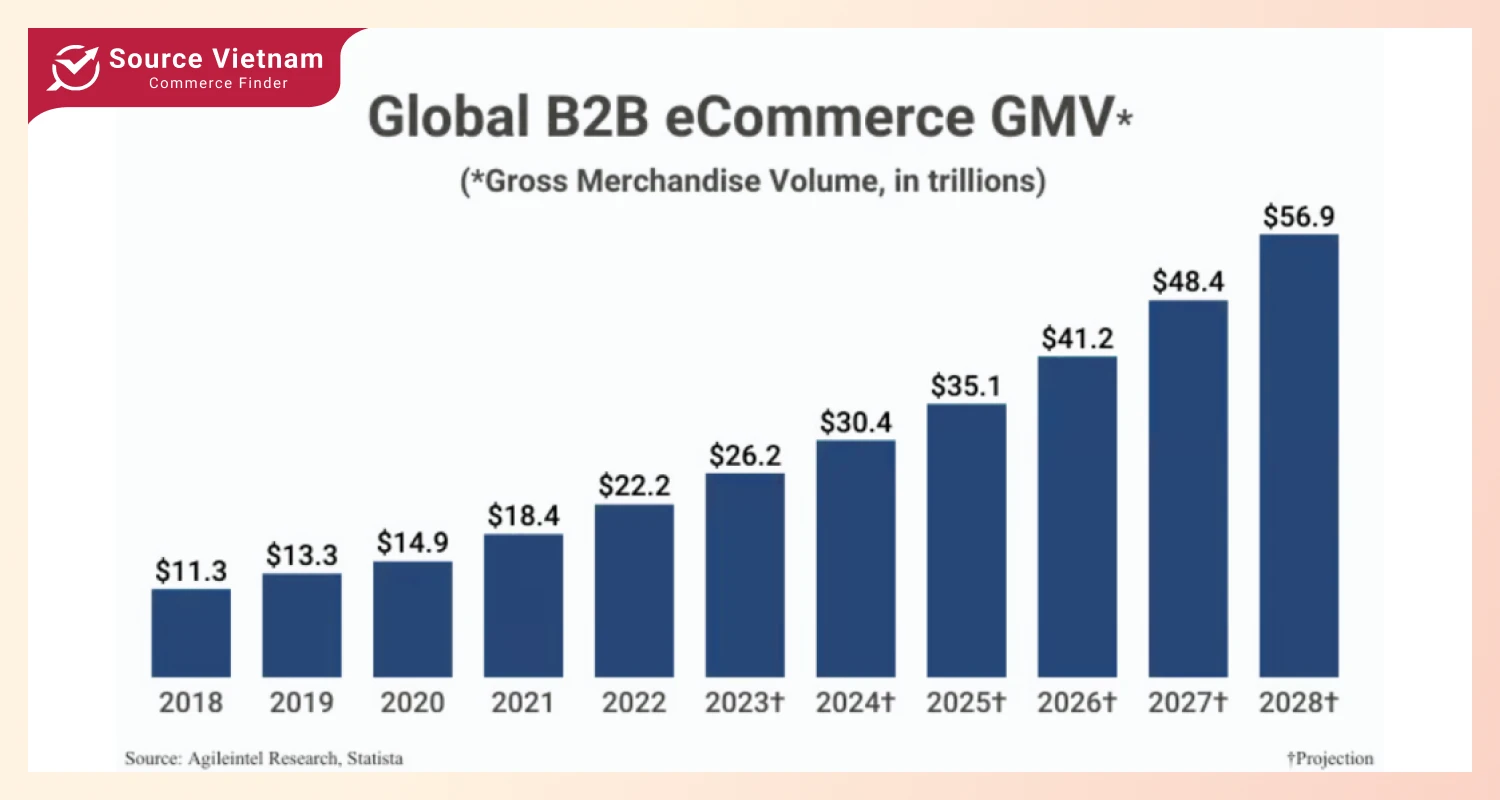
The B2B e-commerce market still remains the sector with great opportunity. The moment has come for distributors, retailers, traders, and manufacturers to improve their online visibility and reach a wider audience.
Here are some of the main points of the B2B concept:
- B2B companies buy raw materials or other products in bulk which they will use in making products or selling to end users
- B2B transactions commonly include great volumes of products depending on the participants
- B2B is distinct from B2C (business-to-consumer). B2C is a model where businesses sell to consumers, such as retail stores
- B2B companies can be product-based, service-based or software-based
B2B is the backbone of many industries, facilitating the production of goods and services in the business world.
After a good understanding of What is B2B, we can bring out differences between B2B and B2C. This table compares B2B with B2C.
The key differences between B2B and B2C
| Aspect | B2B | B2C |
| Target audience | Manufacturers, wholesalers, organizations | Individual consumers |
| Sales volume | Larger transaction sizes, fewer customers | Smaller transactions, more customers |
| Decision-making process | Multiple stakeholders, longer sales cycles | A single person, a quicker sales cycle |
| Product/service customization | High level of customization to meet business needs | Standardized products for mass-market appeal |
| Purchase process | Long negotiations, often involve contracts | Quick purchases, and impulse buying |
| Marketing approach | Focus on building relationship | Focus on immediate needs and wants |
How B2B models work
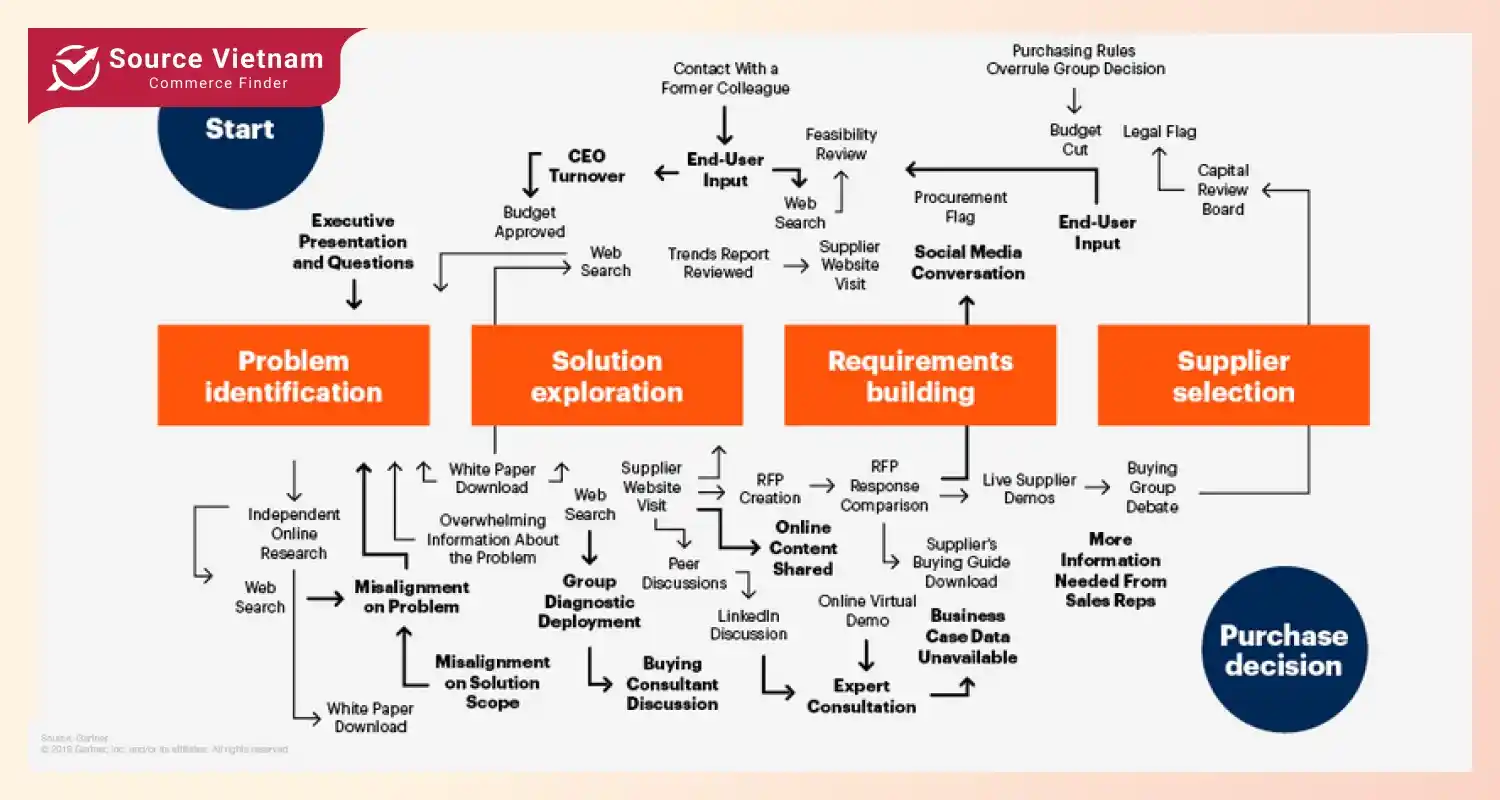
Understanding the mechanics of B2B transactions
When understanding What is B2B, it’s important to consider the B2B transaction process. B2B transactions are more complicated than B2C because they have many stages and take more time.
Why do B2B transactions often take more time? Because in the process of exchanging with partners, businesses always have space and time to negotiate. That allows both parties to get competitive prices, which is good for the company’s financial goal.
The parties must first decide what the other party requires, and then the business gets to ask for samples to see if the quality is acceptable enough to produce and bring in hundreds of thousands.
The B2B transaction process involves many stakeholders, including the board of directors and key decision-makers.
Once the contract is signed, the product or service will be delivered according to its terms.

For B2B companies that have to import foreign products, the process takes even longer.
B2B transactions are now easier. The Amazon report indicates that B2B companies seek new products and suppliers online and on mobile, leading to a rapid shift of B2B transactions to the Internet.
Globalization is changing the way B2B transactions work. How foreign companies can sit in the same building and sell and buy each other’s products without ever having to leave the building, they’re thousands of miles away from each other, and just with a click of a button.
Common B2B business models
Manufacturer and distributor model
One popular model is that of the manufacturer and distributor. The manufacturer distributes products to retail stores or individual consumers after hooking up with wholesalers in this model.

Manufacturers only need to focus on mass producing quality products, while the distributors take care of bringing them to consumers and promoting them.
Distributors always buy products in large quantities to produce huge cash flow for the manufacturer while providing predictable income.
Wholesaler and retailer model
This concept is important in the distribution chain. Wholesalers work with retailers to sell goods in their stores so that customers can purchase them with ease.
The wholesaler-to-retailer process is rather straightforward. Wholesalers buy products in large quantities directly from the manufacturer and then sell them in smaller amounts to retailers.

Some examples are food and beverage, and clothing which all use this B2B model.
With retailers not wanting to stock items, wholesalers also provide a dropshipping approach, which allows retailers to sell successfully online without keeping inventory.
That the products are good quality, the prices are right, and that the procedure and time of competition are agreed upon, are the keys to this B2B model.
B2B service provider
The service provider model emerged as a result of the increasingly personalized needs of businesses over time. All the service providers provide business expert, vertical solutions that are geared to the problems that face their business customers.

B2B service providers come in a variety of forms:
- Recruitment services provide human resource management, training, and recruitment.
- Consulting services provide expert advice on management, strategy, or specific issues within a particular industry.
- Marketing services provide digital marketing, brand building, and advertising.
- Legal services provide general consulting and representing businesses.
- Accounting services provide advising businesses on taxes, accounting, and financial planning.
- Software as a Service (SaaS) provides software solutions that can be accessed online through a subscription.
Top B2B companies leading the industry
IBM (International Business Machines Corporation)
IBM (International Business Machines Corporation) is a prominent business-to-business technology company. Among the many services it offers are corporate software, cloud computing, and AI solutions.
Not to mention IBM’s image of stability, international influence, and long-standing customer relationships going back a century, all of which have given it stability among consumers and investors alike. Relationships that have enabled IBM to become such a trustworthy partner to many firms, kept it on top of the B2B world for decades.
SourceVietnam.com
Similar to Alibaba, SourceVietnam.com facilitates B2B (business-to-business) connections between manufacturers and foreign vendors of hair extension, medical supplies, cosmetics, and more than 600 categories. However, the platform primarily focuses on introducing high-quality Vietnamese items to overseas markets.

SourceVietnam.com makes it easy for vendors to find high-quality products at affordable prices and provides technical solutions for effective communication with manufacturers, resulting in very productive cooperation.
Alibaba
Alibaba is a China-based online B2B company. Alibaba Group encourages international commerce. It connects millions of global wholesalers and retailers to conduct business across a variety of industries. Its massive global reach makes it a successful B2B enterprise.
At Alibaba, retailers can find a winning product to trade globally efficiently because of user-friendly interfaces, secure payment options, efficient logistical infrastructure, and a wide range of goods and services offering reasonable prices.
Microsoft
Nobody on the planet is unfamiliar with Microsoft. This prosperous B2B corporation offers various business solutions, such as corporate software, productivity tools, and cloud services.
Its well-known and extensively used products, such as Microsoft Office and the Azure cloud platform, satisfy companies’ unique requirements while boosting output and effectiveness.
Microsoft is the most trusted and widely used firm in the world because of its security, extensive partner network, and dedication to ongoing innovation. It is a prime example of answering the What is B2B? question.
HubSpot
HubSpot is an inbound marketing and sales software that helps companies turn leads into customers. It is a complete package for social networking, email marketing, and content management.
It has a user-friendly interface, great analytics, and automation. These are key components to any company in today’s world that wants to utilize its full sales and marketing capacity.
The success of this B2B service in the B2B sector can be attributed largely to customer loyalty built by the collection of materials and their dynamic B2B community.
Major benefits of B2B for business growth
The B2B model provides numerous advantages to companies in different sectors. The following are some advantages that make B2B one of the most effective strategies for long-term success and growth:
Scalability and efficiency
B2B operations typically involve larger contracts and bulk purchasing, enabling companies to expand quickly.
With B2B transactions often involving repeat purchases, businesses can more accurately predict their revenue streams and work on expanding their operations over time.
When companies have persistent, large orders, they can expand their production capabilities and improve their supply chain, making it even more efficient.
Example: A software company that secures a contract to provide enterprise solutions to a large corporation can expand its services to new clients without altering its operations.
Repeat business and long-term agreements
B2B partnerships are often based on long-term agreements that guarantee a consistent flow of income for a considerable amount of time.
B2B clients frequently participate in recurring business, which offers consistency. Long-term agreements also encourage cooperation and trust as companies closely cooperate to satisfy one another’s demands.
Example: A manufacturer who enters into a multi-year supply contract with a distributor guarantees steady income, offering a more secure basis for development and financial planning.
A value of higher order
Most B2B transactions have much higher order values than B2C ones. That is because most of the B2B clients usually purchase in bulk; therefore, a single transaction could be large in value.
Also, because corporate demands and return on investment (ROI) drive their purchases, B2B buyers are less price-sensitive than individual consumers, enabling vendors to retain wider profit margins.
Example: A business that sells office supplies may get a contract to outfit a whole corporate office, which would be tens or even hundreds of thousands of dollars, considerably more than any normal business-to-consumer transaction.
Increased industry authority and brand reputation
Successful B2B enterprises frequently establish themselves as leaders in their respective industries by building connections with other reputable organizations.
B2B companies establish a strong brand reputation through long-term collaborations, gaining credibility, and trust, and attracting well-known customers to exert greater influence in their sector.
Example: Working with well-known corporate brands helps a marketing agency establish a reputation for providing top-notch B2B marketing services, which increases its credibility and attracts even more valued clients.
Getting into a worldwide market
Through the B2B model, businesses may reach a worldwide client and grow beyond local markets. Technology and online businesses make it easier for local companies to sell to international markets. It helps them grow globally and reach more customers, which is important in parts of the economy where local demand is not steady.
Example: A cloud service company that provides digital infrastructure solutions can readily grow its clientele and earnings by serving companies worldwide.
Customizable solutions
B2B transactions often require customized products and services that address certain company requirements. By providing specialized solutions that deliver clients greater value, customization solutions enable B2B services to stand out from rivals. Stronger client loyalty results from this and higher fees for specialized products may be charged.
Example: A manufacturer can offer tailor-made equipment to meet a customer’s production needs, strengthening the partnership and guaranteeing ongoing business.
Effective B2B marketing strategies for success
We have defined what is B2B, discussed the various types of B2B companies, and explored its advantages. In this section, we will examine the strategies used in B2B marketing.
Long-term connections, instructional material, and proving value through specific channels are the main goals of B2B transactions. The key strategies that propel B2B marketing achievement are listed below:
Content marketing
It is a key component of B2B marketing strategy. The goal is to produce helpful, high-quality material that aids decision-makers in purchasing.
Content like white papers, case studies, e-books, and blogs that exhibit knowledge is very beneficial since B2B buyers search for in-depth information.
SEO and SEM
B2B companies and B2B service providers must have a robust SEO strategy in place to ensure that potential customers can find them online.
Before making purchases, B2B buyers conduct thorough research, often starting with a search engine. Using SEM (such as Google Ads), creating quality content, and optimizing keywords can significantly boost visibility and lead generation.
Email Marketing
One of the best B2B marketing mediums is still email. During the lengthier B2B sales cycles, email marketing can stay at the forefront of consumers’ minds, nurture leads, and offer insightful information.
Businesses can send highly personalized communications that capture recipients’ attention, by segmenting email lists based on user behavior, job function, and industry.

Social media marketing and LinkedIn
LinkedIn is the top B2B marketing platform. It enables companies to share content, build trust, and connect with decision-makers. While organic methods like posting relevant articles and joining groups can help, paid advertising on LinkedIn allows for precise targeting based on job title, industry, and company size.
Facebook and Twitter are two other social media platforms that can be beneficial for engagement and brand exposure. Some industries use visual platforms like Instagram to showcase their corporate culture or products.
Developing connections and networking
Success in B2B marketing depends on establishing solid partnerships. Businesses leverage credibility, trust, and personal relationships to close agreements.
Whether via industry forums, social media, or events, networking opportunities assist companies in building enduring connections with decision-makers. This long-term strategy guarantees customer loyalty and repeat business.
Marketing using influencers and thought leadership
Developing thought leadership in B2B marketing can significantly increase trust and draw in new customers.
Companies use the influence of influential people in their business to increase engagement and trust by establishing themselves as leaders in their field.
Articles, research reports, and keynote addresses are examples of thought leadership material that may be disseminated across platforms to boost authority and exposure.
Common challenges faced in B2B markets
Although B2B transactions provide huge opportunities for long-term growth and stability, many challenges arise that make sales processes and marketing strategies more complicated than ever. Many of the following problems are found in the B2B sector:
Extended cycles of sales
B2B sales cycles are usually much longer than B2C ones because the products or services are complex and the transaction values are higher.
Prolonged decision-making timeframes result from the buying process’s frequent numerous stages, which include research, assessments, bids, and negotiations.
Delays may occur due to the need for stakeholder alignment, budget approval, and specialized solutions.
Dealing with multiple decision-makers
Many stakeholders, each with distinct interests and concerns, are usually involved in B2B sales choices. There are executives, department heads, procurement teams, and occasionally outside consultants.

B2B vendors might struggle to navigate through the levels of approval because each stakeholder must be convinced of the solution’s value, requiring a tailored approach for each individual or group.
Building trust and credibility
Credibility and trust are essential in B2B transactions, especially when dealing with pricey products and services. Because they often spend significant amounts of money, they need to trust that the source can deliver.
Building trust takes time, openness, reliability, and a proven track record. Without trust, long-term contracts and repeat business are difficult to come by.
Price sensitivity and budget constraints
Financial constraints are still a significant factor in purchase decisions, even if B2B clients might not be as price-sensitive as individual consumers.
Since many companies have tight budgets, B2B suppliers must deliver competitive pricing without losing the quality or breadth of their services.
Closing agreements typically entail negotiating favorable contract terms and offering various payment options.
Global competition
Competitive pressure can be felt when B2B markets go global. E-commerce growth has meant that the marketplace now opens up to the world, and B2B companies can compete across boundaries.
B2B companies face tough competition as clients have many options. To stay competitive, B2B businesses should focus on innovation, customer experience, and specialized offers.
Conclusion
B2B, or business-to-business, refers to the exchange of products and services between businesses, which plays a crucial role in the global economy.
B2B presents companies with the potential for long-term success by focusing on relationships, scalability, and efficiency.
It is crucial for any company aiming for success in this field to understand “what is B2B,” B2B marketing strategies, and the related challenges.
FAQs about B2B
What differentiates B2B from B2C?
The distinction is in the intended audience. B2B serves other companies, whereas B2C targets individual consumers.
What do some B2B companies look like?
IBM, Microsoft, and SourceVietnam are some of the best examples of B2B companies that offer technological services to other companies.
How can companies become successful in their business with B2B marketing?
Businesses can identify and attract B2B audiences by concentrating on relationship development, utilizing digital multimedia content marketing, and social networks like LinkedIn.
Is B2B suitable for only large companies, or can it assist small businesses?
Small businesses might profit from B2B by providing specialized services or collaborating with different companies to create mutually beneficial ties.
References:
- https://www.digitalcommerce360.com/product/b2b-market-and-customer-experience-report/
- https://www.amazon.com/


